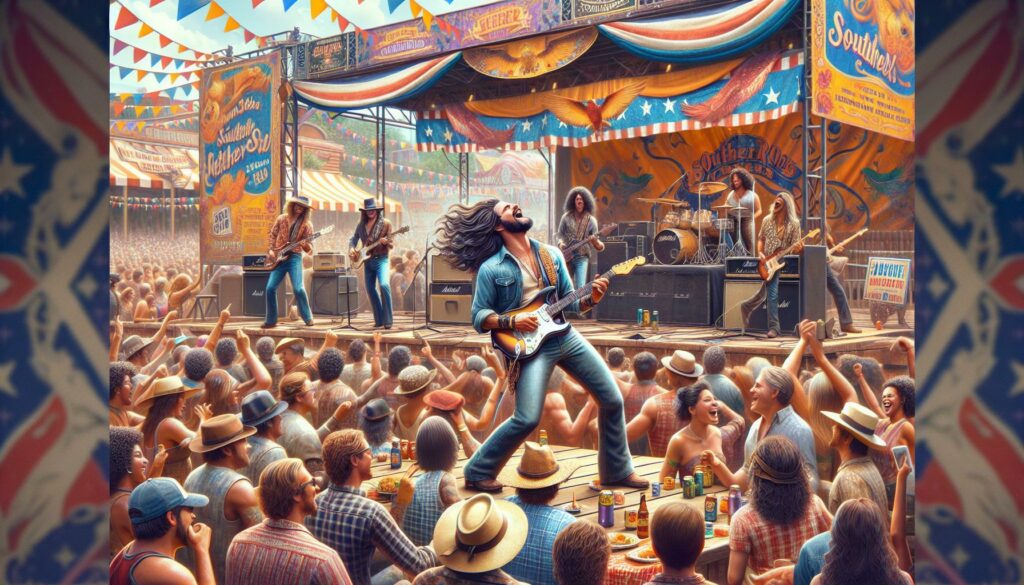Southern rock music captures the spirit of the American South, blending rock, country, and blues into a sound that’s both powerful and soulful. Growing up surrounded by this genre, I’ve always been drawn to its raw energy and heartfelt storytelling. Bands like Lynyrd Skynyrd and The Allman Brothers Band not only defined the sound but also shaped a cultural movement that resonates with fans to this day. The genre’s roots run deep, reflecting the rich musical traditions of the South. From its signature guitar riffs to its anthemic choruses, southern rock speaks to a sense of freedom and rebellion. As I dive into the history and evolution of this iconic music style, I hope to share insights that highlight its enduring appeal and influence on contemporary artists. Join me as we explore the rhythms and stories that make southern rock a beloved staple in American music.
- Genre Definition: Southern rock is a unique musical fusion of rock, country, and blues that embodies the cultural essence of the American South, emerging in the late 1960s and gaining popularity in the 1970s.
- Musical Characteristics: The genre is characterized by signature guitar riffs, soulful vocals, and anthemic choruses, driven by themes of freedom, rebellion, and Southern lifestyle.
- Cultural Influence: Southern rock deeply reflects Southern culture, using personal storytelling and imagery that resonate with listeners, emphasizing regional pride and shared experiences.
- Notable Bands: Iconic groups like Lynyrd Skynyrd and The Allman Brothers Band have been pivotal in shaping the genre, leaving a lasting impact through their powerful music and performances.
- Evolution Over Time: The genre has evolved through the decades, incorporating diverse influences while maintaining its core essence, thus remaining relevant in modern music.
- Modern Day Relevance: Contemporary artists in various genres continue to draw from southern rock, ensuring its legacy endures and connects with new audiences through festivals and new musical expressions.
Southern Rock Music
Southern rock music uniquely blends rock, country, and blues, showcasing the cultural essence of the American South. The genre emerged in the late 1960s and gained prominence in the 1970s, with bands like Lynyrd Skynyrd and The Allman Brothers Band leading the charge. This fusion often features powerful guitar riffs, soulful vocals, and anthemic choruses that convey themes of freedom, rebellion, and the Southern lifestyle.
Southern rock typically includes instrumentation such as electric guitars, bass, drums, and keyboards, creating a distinctive sound that resonates with audiences. The lyrics often reflect Southern culture, incorporating personal stories, regional pride, and social themes.
Key elements of southern rock music:
- Guitar Riffs: Signature riffs characterize many southern rock songs, creating memorable hooks.
- Vocals: Passionate and emotive singing conveys strong narratives and personal experiences.
- Rhythms: A blend of rock rhythms with country twang gives the genre its unique feel.
- Influences: Blues and folk influences enrich the sound, providing depth and authenticity.
The genre’s influence extends into modern music, affecting artists across various genres, ensuring its legacy endures. Southern rock’s rich history and vibrant sound continue to inspire new musicians, solidifying its place in American music culture.
Origins of Southern Rock Music
Southern rock music emerged from a rich tapestry of musical influences, intertwining rock, blues, and country elements that reflect the unique cultural heritage of the American South. This genre captures a sense of place and identity, resonating deeply with its audience.
Influences from Blues and Country
Blues and country music serve as foundational pillars for southern rock. The raw intensity of blues guitar riffs and soulful vocals laid the groundwork for the emotional expression found in southern rock. I observe that bands like The Allman Brothers Band exemplify this influence with their extended guitar solos that echo traditional blues. In parallel, country music’s storytelling approach permeates the lyrics of southern rock, often showcasing personal experiences and regional narratives that resonate with listeners.
The Role of Southern Culture
Southern culture profoundly impacts southern rock music, articulating themes of pride, rebellion, and a connection to the land. Iconic lyrics often reflect a sense of belonging and the struggles faced by individuals in the South. I find that this cultural backdrop shifts the genre from mere musicality to an expression of lifestyle and values. Southern rock celebrates a unique identity, uniting fans with shared experiences, making it a powerful voice for Southern pride.
Key Characteristics of Southern Rock Music
Southern rock music is distinguished by its unique blend of genres and powerful emotional expression. The elements that define this genre encapsulate the heart and soul of the American South.
Musical Elements and Instrumentation
Southern rock features prominent guitar work, characterized by a mix of electric and acoustic guitars. Signature guitar riffs and solos provide a driving force in the music. Rhythm sections, typically including bass and drums, contribute to a heavy yet groovy sound. Additionally, harmony vocals add layers of depth to songs, creating a rich auditory experience. Instruments like the slide guitar often appear, enhancing the Southern flavor. Bands like Lynyrd Skynyrd showcase this with their anthemic tracks.
Lyrical Themes and Imagery
Lyrical content in southern rock often reflects personal stories and Southern culture. Themes of freedom, rebellion, and working-class pride recur throughout many songs. Imagery paints vivid pictures of Southern landscapes, lifestyle, and experiences, fostering a sense of connection among listeners. References to cars, small towns, and relationships frequently surface in the lyrics. The use of colloquial language adds authenticity, resonating with audiences who share similar backgrounds. This distinct lyrical approach forges a powerful bond between the genre and its fans.
Notable Southern Rock Artists and Bands
Several artists and bands significantly shaped southern rock, creating a lasting impact on the genre and its fans. Below are two of the most influential acts in southern rock history.
Lynyrd Skynyrd
Lynyrd Skynyrd emerged as one of the defining bands of southern rock. Formed in 1964 in Jacksonville, Florida, their sound features powerful guitar riffs and memorable melodies. Hits like “”Sweet Home Alabama”” and “”Free Bird”” showcase their signature style, combining southern pride with electrifying performances. Their tragic plane crash in 1977 marked a turning point, yet their music continues to resonate with audiences today, embodying themes of freedom and rebellion.
The Allman Brothers Band
The Allman Brothers Band played a critical role in the southern rock movement, known for their pioneering blend of rock, blues, and jazz. Formed in 1969 in Macon, Georgia, they introduced innovative musical structures and improvisation, making them notable for extended live jams. Songs like “”Ramblin’ Man”” and “”Jessica”” exemplify their skillful guitar work and rich harmonies. The band’s influence on the genre is profound, inspiring countless artists with their soulful sound and emotional depth.
The Evolution of Southern Rock Music
Southern rock music has undergone significant changes since its inception, adapting to the evolving musical landscape while retaining its core essence.
Changes in the Genre Over the Decades
Southern rock music experienced a major transformation during the 1980s and 1990s. Artists began incorporating influences from other genres, leading to a diversification of sound. Bands like Outlaws and 38 Special introduced more polished production and mainstream appeal, while maintaining traditional southern rock characteristics. The genre’s lyrical content shifted as well, emphasizing themes of partying and personal freedom. In the late 1990s and early 2000s, a resurgence occurred, with emerging bands like Drive-By Truckers and Blackberry Smoke redefining southern rock. These artists blended traditional sounds with modern lyrical themes, reflecting current social issues while honoring the genre’s roots.
Southern Rock in Modern Music
In modern music, southern rock continues to influence various genres. Contemporary artists often draw upon its signature characteristics, merging rock, country, and blues elements. The rise of country-rock hybrids has allowed southern rock to thrive within the country music scene. Artists like Miranda Lambert and Chris Stapleton incorporate southern rock sensibilities, infusing their music with heartfelt storytelling and powerful instrumentation. Festivals celebrating southern rock also attract diverse audiences, fostering a resurgence of interest in both classic bands and new talent. This ongoing evolution ensures that southern rock remains relevant, maintaining its cultural significance and connection to the Southern heritage.
Southern rock music is more than just a genre; it’s a celebration of culture and identity. The powerful guitar riffs and soulful lyrics resonate deeply with those who share a Southern heritage. I’ve always felt a strong connection to the themes of freedom and rebellion that this music embodies. As I listen to the classics and discover new artists, I see how southern rock continues to evolve while staying true to its roots. It’s inspiring to watch this genre influence modern music and bring together fans from all walks of life. Southern rock isn’t just a sound; it’s a movement that unites us through shared experiences and a love for the rich tapestry of Southern culture.



